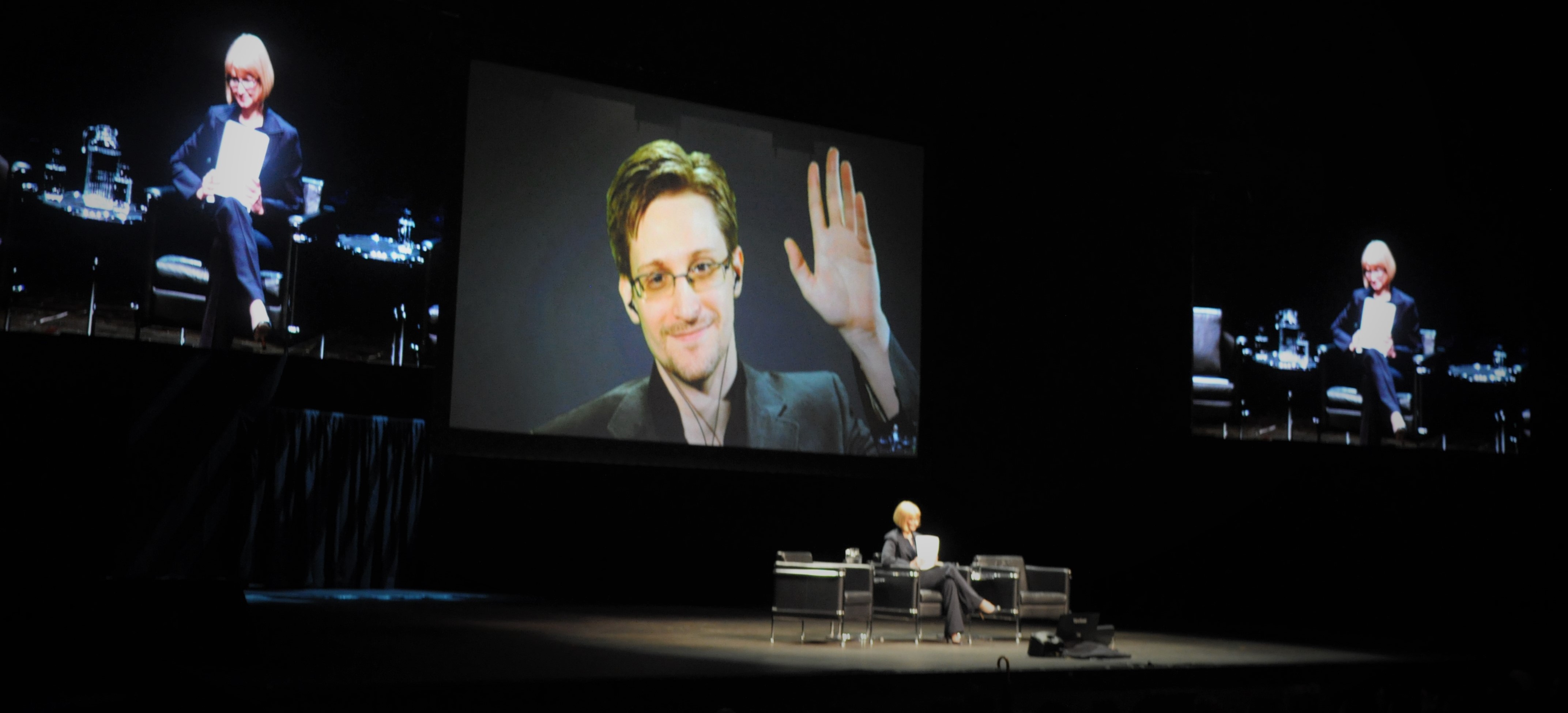“To whom do you owe a bigger loyalty: to the law, or to justice?”
Former NSA contractor Edward Snowden, who gained international fame after leaking classified documents to journalists at The Guardian, reflected on his choice to risk his safety and his life to expose the actions of the American government, which included monitoring private phone calls and emails. “Eventually, you have to make an individual decision, a moral decision, a decision of conscience,” he said.
As the last entry in the Spring 2016 President’s Dream Colloquium on Big Data, Snowden spoke to a crowd of roughly 3,000 people at a packed Queen Elizabeth Theatre, with even more watching via live webstream. Charged with three felonies and unable to return to his home in the United States, Snowden is currently living in Russia on a three-year temporary asylum.
Shane Pointe, elder-in-residence of the Vancouver School Board and a member of the Musqueam band, began the night with a traditional Coast Salish greeting. Pointe had kind words to say about Snowden: “He’s a brave man who did a brave thing: He told the truth.”
CBC anchor Laura Lynch moderated the event and did not mince words as to the controversy surrounding the featured speaker. “To some he is a hero. To others he is a traitor.”
Responding to a question on the recent Panama Papers leak, which have shown mass tax evasion and implicated multiple public figures, most notably the recently-resigned Prime Minister of Iceland, Snowden spoke from his personal experience about the courage involved in whistleblowing. “I signed up to defend my country,” he remarked about his decision to join the NSA. However, according to Snowden, the oath he took was to defend the constitution not the agencies of the government, or the even the President. “It’s not an oath to secrecy.”
Snowden spoke to recent developments in the technology landscape, with special praise reserved for Whatsapp, the world’s most popular instant messaging app. The makers of the app recently decided to implement end-to-end encryption for the personal messages of its users. Snowden heralded apps like Whatsapp and Signal as tools the everyday person could use to avoid government collection of personal data.
“Terrorism is a serious threat, but let’s not pretend that it’s an existential threat to our society.”
Perhaps the most provocative discussion of the night came when Panelist Micheal Vonn, also Policy Director of the BC Civil Liberties Association, asked him about why governments pursue mass surveillance projects, even though empirical evidence has shown that they are ineffective in stopping terrorism.
Snowden argued that terrorism is used as a justification to the public for the existence of these programs. What are the true motivations of programs such as PRISM? According to Snowden they include “diplomatic manipulation, economic espionage, and social control.”
He came prepared with a litany of examples to support his controversial thesis, including the government’s attempts to track the pornographic viewing habits of “radicals” in order to discredit them later on. Snowden also noted that GCHQ, the British equivalent of the NSA, has categorized journalists as a “threat,” falling between hackers and terrorists on their scale.
Inevitably, the topic of Bill C-51 came up, now known as Canada’s official Anti-terrorism Act. Said Snowden, “Terrorism is a serious threat, but let’s not pretend that it’s an existential threat to our society.” He suggested that the purpose of such a law in Canada may be to contribute to an international database, from which intelligence agencies such as the NSA to the GCHQ could draw.
Answering a final question from the audience on whether or not citizens can trust politicians, Snowden reiterated his belief in values such as transparency and integrity within government. He noted that a society that values privacy must always allow for some risks, but that these risks are ultimately worth taking in order to preserve our personal freedom.
“The cost of democracy is uncertainty,” he said. “We won’t be safe in every circumstance, but that’s not a weakness, it’s a strength.”
Here are some of the best tweets from the night:
https://twitter.com/SFUPublicSquare/status/717551266235199490
https://twitter.com/MikeSoron/status/717541254230204416
https://twitter.com/thatMJS/status/717555384848764928
https://twitter.com/iouce/status/717552215137726466
https://twitter.com/samaahjaffer/status/717551699347382272
https://twitter.com/PeakSFU/status/717553415761436672
https://twitter.com/AjayLack/status/717515809380118530


“To some he is a hero. To others he is a traitor.”
I don’t understand how anyone can consider him a traitor. He risked his life to reveal the truth.
He’s a traitor to the people who are trying to keep that truth secret from the people.
He’s betraying traitors.